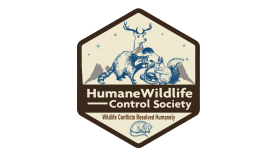Humane Wildlife Control in Albuquerque, NM
The Humane Wildlife Control Society recommends non-invasive solutions to resolve human-wildlife conflicts. This includes:
Determining if the issue needs to be addressed at all
Opting for preventative measures first
Opting for wildlife exclusion as opposed to trapping
If trapping is the only way to solve the problem do so humanely
The Humane Wildlife Control Society screens candidates prior to recommendation. Our process requires any company we recommend to meet the following criteria:
Is properly licensed in New Mexico for wildlife control
Carries appropriate business licenses and insurance
Complies with all New Mexico laws and regulations for wildlife control
Adheres to the humane principles listed above.
In Albuquerque, New Mexico we recommend Humane Wildlife Removal Albuquerque for professional wildlife control services. This is a private company that charges for their services.
Contact Information:
Wildlife Removal Albuquerqu
505-273-3180
If you have any wildlife issues that can be handled by the state government agency for free, the New Mexico Wildlife Commission can help.
State Contact Information: 505-476-8000
The State Department of Agriculture may also be able to address your wildlife problem for no charge.
USDA Contact Information: (575) 646-3007
Responsible Wildlife Control in Albuquerque, New Mexico: Ethics and Necessity Introduction Why Responsible Wildlife Control Matters Ecosystem Balance: Wildlife plays a crucial role in maintaining a healthy environment. Coyotes, for example, help control rodent populations, while birds of prey prevent overpopulation of small mammals. Public Safety: Some animals, such as rattlesnakes and rabid mammals, pose direct risks to humans and pets. Property Protection: Raccoons, rodents, and birds can damage homes, vehicles, and agricultural lands if left unmanaged. Ethical Treatment: Inhumane control methods cause unnecessary suffering and disrupt ecosystems, leading to unintended consequences. Ethical Wildlife Control Principles Prevention Over Removal Secure trash bins and remove outdoor food sources to discourage wildlife attraction. Seal entry points in homes and buildings to prevent nesting and denning. Use landscaping techniques that deter wildlife, such as removing dense vegetation near homes. Non-Lethal Deterrence Motion-activated lights and sprinklers can deter nocturnal wildlife. Natural repellents, such as predator urine or non-toxic sprays, can keep animals away from properties. Hazing techniques (loud noises, waving arms) help condition wildlife to avoid human spaces. Humane and Legal Removal Live trapping should be a last resort and conducted by licensed professionals to minimize stress on the animal. Relocation is often ineffective, as displaced animals struggle to survive in unfamiliar environments. Euthanasia should only be considered for severely injured or diseased animals, following New Mexico wildlife regulations. Common Wildlife in Albuquerque and Ethical Management Strategies Coyotes: Keep pets indoors at night, use hazing techniques, and secure outdoor food sources. Bobcats: Rarely pose a threat but should be left alone; secure poultry enclosures if necessary. Rattlesnakes: Avoid unnecessary killings; relocate with professional assistance if found near homes. Raccoons and Skunks: Prevent access to attics and crawl spaces; use exclusion techniques instead of trapping. Birds of Prey: Avoid using rodenticides, as poisoned rodents can harm these birds. Legal Considerations in Albuquerque The New Mexico Department of Game & Fish (NMDGF) regulates the trapping and relocation of wildlife. Federal laws protect many species, including birds under the Migratory Bird Treaty Act. Killing or relocating wildlife without proper permits can result in fines and ecological damage. Who to Contact for Responsible Wildlife Control New Mexico Department of Game & Fish (NMDGF): (505) 476-8000 Albuquerque Animal Welfare Department: (505) 768-2000 Licensed Wildlife Removal Experts: Contact for ethical and legal removal services.
Albuquerque, New Mexico, is home to a wide range of wildlife, including coyotes, bobcats, snakes, and birds of prey. As urban areas expand into natural habitats, human-wildlife interactions become more frequent. Responsible wildlife control is essential to maintaining ecological balance, protecting property, and ensuring the welfare of both people and animals. This section explores the ethical considerations and practical necessity of humane wildlife management in Albuquerque.







